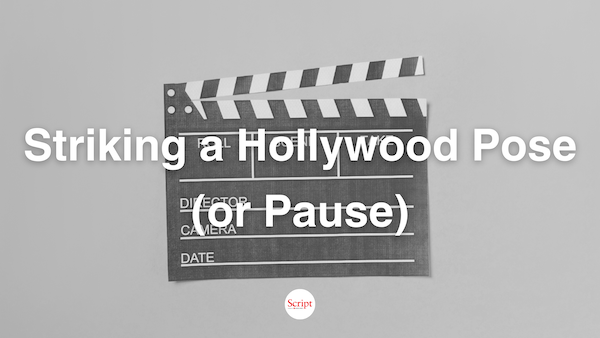Legally Speaking, It Depends: Co-Writers
Writing is a lonely business. Filling a blank page all by yourself is daunting. (I know, I was just staring at one.) So there is an attraction to going in…
Writing is a lonely business. Filling a blank page all by yourself is daunting. (I know, I was just staring at one.) So there is an attraction to going in with a partner to share the load, fill the gaps and commiserate with over the rejections. Writing partners are an attractive proposition. But partnerships shouldn't be entered into without consideration of the potential perils and pitfalls collaborative work entails. Should you write with a co-writer? It depends...
Creative Considerations
Sometimes, we use crutches. Sometimes we fall into tropes. Sometimes we're just stuck. I have to admit it'd be nice to have someone there to point out when I do lazy writing and help out with the drudgery of getting work done. The lure of having a helping hand to do those things we don't like to do or don't feel we do well is often tempting. And there is a lot of precedent for successful writing teams that make it work.
I have heard of some writing teams that divvy up the tasks in unique ways. Like one writer creating characters then handing them over to another writer to kill them off when the original writer likes them too much. Some competitive writers each take consecutive cracks at the same scene, trying to better the results of the last writer's take each time. Some writing teams parsimoniously divide the script into distinct snippets, then go off and write independently. Once they both finish they combine efforts to try to make it seem it was written by one voice, somehow. There are no right ways to do it. If you find one way that works for you and your collaborator, congratulations. But make sure it really works. Because if it doesn't, things can really get complicated.
Business considerations
You have to slice the pie – First consideration is that you have to share in whatever rewards the work brings. From as simple and silly (though not really either) of deciding whose house the Academy Award stays, to deciding how to split up the profits if you're finally able to have some. A simple “share everything equally” sounds good, but, what if one writer starts to slack off on the workload, but, still wants half the pie. (Greedy bastard, unless that's you, of course.)
Too many cooks – giving a writer notes is hard enough for one writer to take, multiply that times the number of teammates and the difficulties can quickly get out of hand. With effort you might be able to put the time in to cultivate a productive working relationship with a co-writer and create a great script. Throw in one producer's comments, taken completely differently by both writers and suddenly nothing can move forward. Savvy producers recognize this potential and often attempt to avoid it (by not working with writing teams at all) unless they are proven and/or are great. (And if a newfound team created a great first draft, the producer still might quickly bring in a fresh, single rewriter to save potential untested headaches.)
SIDEBAR: & vs. AndIn writing credits on movies you've probably seen that sometimes the writers are listed using an “AND” connecting them and sometimes an “&”. What gives? To keep from diminishing the prestige of the profession the WGA has established that only three official writers can be credited. But they allow one or more of those credited writers to be writing teams. To distinguish between them the nomenclature uses&- between co-writersAnd- separate writersThis means that even under the limited strictures of the Guild's rules there could be six (or more) people listed when teams are involved.
"I thought that was your job." – who writes what? What is considered collaboration? What's just getting advice or throwing out an idea? What part of the work gets credit? Who takes credit? Who talks for the team? Who decides what to accept in offers? All hard questions, especially if you haven't discussed every possibility ahead of time – AND AGREED to it all.
All things must come to an end – No one wants to think about it, but, partnerships don't last forever. There is always the potential for breakups over an untold number of things: creative disagreements, health issues, monetary needs, and the big one, death. How does the work survive these? How do the individual writers? Thinking about the, “Oh, that'll never happen,” events ahead of time can make smooth transitions away from brick walls, if you plan for them.
Write all the “what if's” down and decide them ahead of time and you'll be prepared for a fruitful partnership. It might be a good idea to get a disinterested third party to manage the negotiations so that the partners have someone else to blame, eh, I mean, have a cool head that can see both sides. Every partnership is unique, but, it doesn't mean that the considerations haven't been thought about by others. Do a little research into how other partnerships make things work and see if you can't find some ideas and maybe some things to think about. And WRITE IT DOWN. When the rough times show up, you'll be glad you planned ahead for them and know the thinking of your partner and what's important to each of you.
Legal Considerations
Legally, there are a few considerations that come to play in co-writer relationships that aren't applicable when you are solo. One of the big ones is how copyright is addressed.
According to U.S. Copyright law, Chapter 1, when more than one individual prepares a work “with the intention that their contributions be merged into inseparable or interdependent parts of a unitary whole” or, in other words, work together to create a thing on purpose, then that creates a Joint Work and all the involved individuals share authorship equally. (Author is copyright-speak for the creator of a copyrighted work, to differentiate it from owner who is the currently controling entity able to exercise the rights entailed with copyright.)
Joint Authors – Though the term doesn't appear in the Copyright statutes, co-writers are often referred to as Joint Authors of the work. They initially hold all rights to the work together. With no other arrangements in place, any Joint Author can act the same as a sole author would with regards to the rights; assigning them, parsing them out, authorizing derivative works, etc. without the prior knowledge or even agreement of the other co-authors needed. Joint Authors are even prevented from ever suing their co-writers for copyright infringement. The only stipulation is that the acting author must share whatever gains with the other author(s) equally unless other arrangements exist between them. (Can you see where I'm going here?)
By Copyright law alone, co-writers are equal troublemakers.
This conundrum of all authors of a work being able to make unilateral decisions about the work is a big issue. And since a motion picture falls under the definition of a Joint Work, you can imagine how antsy producers can be about it. Which is why movie studios get everyone working together to create a single film to participate on a Work Made For Hire basis. (That's the correct term, Work-For-Hire is so 1970s-- pre-1978 to be exact.) Work Made For Hire collaborators, be they employees or properly formed independent contractor relationships, do not get a share of the copyright authorship. Under Work Made For Hire, the employer alone is the official Author for copyright purposes.
No matter how much studios would like otherwise, Work Made For Hire doesn't apply to a spec sale, though, since the original work was created before the eventual employer (e.g. the studio) got involved. So co-writers need to plan for and accomodate the issues of Joint Authorship anyway. Luckily, the quagmire of Joint Works authorship can be moderated by contractual agreement between the authors.
Collaboration Agreement
A co-writing arrangement is a Partnership, in legal as well as social sense. Just as it makes sense to set out the bounds, responsibilities and expectations of any partnership before the venture is pursued, it makes sense to set out the groundwork and working arrangements ahead of getting any writing done on a co-writer relationship. All of these issues and more should be considered and hammered out as to who does what, what expectations are set for each co-writer, and what to do if someone isn't pulling their weight. I know that stopping at the beginning, with everyone happy and raring to go on the project seems counter productive, but, believe me, the negotiations are MUCH easier when everyone is happy. And to make sure everyone is on the same page and that there is full understanding of everything involved from day one will make every other day-- especially those bad, bad days-- so much easier to deal with.
Without such protections you could leave yourself in the position where a disgruntled former co-writer goes off, sells the script you both were working on for $1 and as long as he gives you 50 cents, there's nothing you can do about it.
Breaking Up Is Hard (And Complicated) To Do
Don't forget to consider the ramifications of breaking up the co-writing arrangement. You will likely have work that completed that you'll need to decide on how to exploit and share in in the future. There will likely be work in progress and so who gets to continue development of that work and under what arrangements of compensation for the participation of the former partner need to be addressed. And future works that derive from previous partnered works should be discussed as well so that there isn't confusion or disgruntlement as success takes different forms for the former co-writing team.
Contributors vs. Co-Writers
Make sure that you really are going into a co-writer relationship when you intend to and make clear when that is not the intention. It is often necessary to clarify that contributions, say a great idea for a scene that comes from an outsider that gets incorporated into the script, are not sufficient to establish an ownership of the finished product. Remember that Copyright requires that all co-authors are intending to create a single work with those participants. If some think they are co-writing and others think its just kicking around ideas, then you don't have the requisite intentions in place. That doesn't mean that the contributor might not be miffed for not being included and still make a stink later on. It's best to clarify when contributions are not going to rise to the level of co-writing as well as when they are. Do it before it goes too far and you'll be happier in the end.
Related Articles:
- Behind the Lines with DR: The Smoking Gun
- Legally Speaking, It Depends: They Stole My Movie Idea
- Primetime: The Truth About Protecting Your Work
Tools to Help:
Christopher Schiller is a NY transactional entertainment attorney who counts many independent filmmakers and writers among his diverse client base. He has an extensive personal history in production and screenwriting experience which benefits him in translating between “legalese” and the language of the creatives. The material he provides here is extremely general in application and therefore should never be taken as legal advice for a specific need. Always consult a knowledgeable attorney for your own legal issues. Because, legally speaking, it depends... always on the particular specifics in each case. Follow Chris on Twitter @chrisschiller or through his website.







